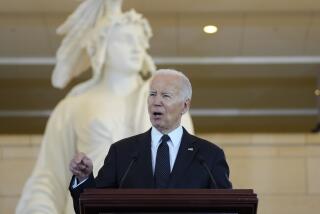Hate-Crimes Law Debated by High Court : Penalties: Issue centers on the government’s power to give harsher sentences for criminal acts engendered by racial or ethnic bias.
- Share via
WASHINGTON — The Supreme Court heard arguments Wednesday over the constitutionality of a so-called hate-crimes law--this term’s most important free-speech dispute--and appeared inclined to uphold laws that punish criminal acts inspired by racial or ethnic hatred.
At issue is the government’s power to impose harsher penalties on criminals who target blacks, Jews, gays or other persons because of their race, religion or gender.
The case before the court Wednesday involved a Wisconsin law that permits juries to give longer prison terms to criminals who “intentionally select” their victims because of their race, gender or sexual orientation. California and at least 20 other states have similar laws, and Congress is considering a proposed federal law to raise the penalties for bias-motivated crimes.
Last year, the high court unanimously struck down a St. Paul, Minn., law against cross burning because it violated the First Amendment’s guarantee of free speech. Its broadly worded opinion cast doubt on all laws that punish expressions of hatred.
But during Wednesday’s arguments, the justices expressed skepticism about extending that principle to strike down measures that punish criminal conduct inspired by hatred.
By the end of the hour of debate, even Justice Antonin Scalia, the author of last term’s strict free-speech opinion, seemed ready to endorse a hate law that punishes an existing crime, such as assault.
The issue arose when Todd Mitchell, a 19-year old black, allegedly urged several of his friends to “move on some white people.” They subsequently beat up a 14-year-old white boy on a street in Kenosha, Wis.
Mitchell was sentenced to two years in prison for aggravated battery. Two more years were added to his sentence because the crime had been racially motivated.
However, the state Supreme Court deemed the extra punishment unconstitutional, contending that it punished “a thought crime.” Had Mitchell not uttered his comments about white people, he would not have had his prison term doubled.
Justices David H. Souter and Anthony M. Kennedy commented that traditional criminal laws punish bad thoughts that result in criminal conduct. In addition, last year, Justices Byron R. White, Harry A. Blackmun and John Paul Stevens said that they did not support a broad free-speech ruling that would sweep aside civil rights laws and measures that punish hate actions.
A ruling in the case (Wisconsin vs. Mitchell, 92-515) is due by July.
Also Wednesday, in what amounted to a setback for prosecutors, the Supreme Court refused to limit the power of federal judges to hear appeals from state prison inmates who maintain that they were questioned by police in violation of the Miranda rule. The 1966 rule requires police to warn suspects in custody that they have a right to remain silent.
In a 5-4 ruling in a Michigan case (Winthrow vs. Williams, 91-1030), the court rejected arguments by prosecutors who said that prisoners should not get the benefit of second-guessing by federal judges.
More to Read
Sign up for Essential California
The most important California stories and recommendations in your inbox every morning.
You may occasionally receive promotional content from the Los Angeles Times.











